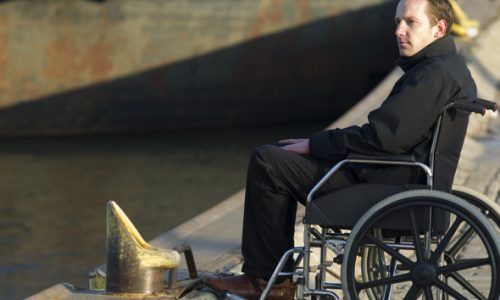If you have suffered a spinal injury, you may be entitled to claim compensation.
CALL 0800 083 5500
A spinal injury can cause drastic changes to a person’s life, and making a claim for compensation can help you cover the costs of future care and loss of earnings.
Contents:

Claiming spinal injury compensation for you or for a family member is about more than just receiving compensation for your pain and suffering. It is about gaining financial security for you and your family for the long-term; it is about ensuring the professional care you need can be afforded, both now and in the future.
Your spinal injury claim is also about getting you the help you need to overcome the challenges of such an injury. This can mean securing compensation to pay for amendments to your home, so it better meets your needs, or to provide for moving to a new home altogether. Your spinal injury claim can also provide for any equipment or transportation necessary to assist you or your family member in daily life.
Spinal injuries can happen in several different ways and identifying what type of injury you have sustained and how it has affected your life will be crucial to the success of your claim.
Any financial settlement will depend largely on how much long-term pain and/or disability you suffer because of your injury. The severity of spinal injuries can vary tremendously, from someone being in pain for only a few weeks to being permanently disabled or in pain for life.
Spinal injuries could be caused by:
Even so-called common spinal injuries can have huge effects on your daily life. They can cause great pain and severely impact movement. Having to miss out on work, or having your prospects affected could be grounds for a compensation claim.
Injuries to the spine can be complex. This is due to the significant, debilitating effects such injuries can have and the impact they can have on the life of the injured individual.
Every spinal injury will be different, so the amount of compensation received will vary case by case. To get the maximum compensation for you and your family, it is best to speak with one of our solicitors and get an expert opinion.
As mentioned before, the amount of compensation you could receive will be directly influenced by the severity of the injury and the ongoing effect that it is going to have on your life. An injury that leaves a long-lasting impact on you and your family’s lives will likely receive more compensation than one that has a short-term impact.
Some spinal injuries are so serious that a person can be left paralysed. It is in these types of cases where compensation is needed for a person to adapt to their circumstances.
You can also use our claims calculator below, to get a rough idea of how much compensation you could be entitled to.
The compensation you receive for your spinal injury is designed to help you pay for the changes to your life resulting from your spinal injury.
Depending on the severity of the injury, damage to the spine could leave a person unable to walk, work, or properly care for themselves. A compensation claim helps pay for providing future care, adaptations to your home, and any loss of future earnings.
Blackwater Law personal injury solicitors successfully obtained £3.2million compensation for Mr Irving who suffered serious spinal injuries and was left disabled after falling down stairs.

Even so-called common spinal injuries can have huge effects on your daily life. A spinal injury can cause great pain and severely impact movement. Having to miss out on work, or having your future prospects affected could be ground for a compensation claim.
Where the cord is severed completely all functionality will be lost. However, advances in medicine and treatment can in some cases provide for some recovery of function.
Where the cord is only partially severed, providing for the retention of some function, but this will be dependent on the extent of the injury in each case. Incomplete spinal cord injuries are reported to account for a growing proportion of spinal injuries due to better awareness of how to deal with patients with a back or neck injury posing a risk of damage to the spine. Improper handling or treatment of an individual with a partial spinal cord injury could make this worse, causing the cord to sever completely.
Common incomplete spinal cord injuries include:
Anterior cord syndrome – An injury to the front of the spinal cord causes problems with controlling movement. Some sensations may be retained.
Central cord syndrome – Damage to the nerves carrying signals from the brain to the spinal cord causes issues with fine motor skills, paralysis of the arms and impairment in the legs to a lesser degree.
Brown-Sequard syndrome -Damage to one side of the spinal cord causes issues in movement and sensation in one side of the body.
Tetraplegia or quadriplegia – Where the injured individual is unable to move below part of the spine which is injured, potentially affecting bladder control as well as movement and sensation in the limbs. Breathing may also be affected due to the diaphragm being controlled by spinal nerves.
Paraplegia – Refers to injuries resulting in loss of sensation and control of movement in the lower half of the body and legs. The higher up the spine the injury, the more severe the symptoms the injured individual is likely to present with.
Triplegia – Where sensation and control of movement are lost in one arm and both legs and is often the result of an incomplete spinal cord injury.
In 2021, just over 3% of claims required court proceedings for parties to come to a resolution. It is therefore unlikely that you will need to go to court.
Most claims can be settled out of court, so long as both parties can agree to a settlement amount. A claim may only need to go to court if there is a disagreement over who was at fault for the incident, or if there is a disagreement over the amount of compensation awarded.
Spinal injury cases have the potential to be extremely complex and could take a while to reach a resolution. It is essential that you choose the right spinal injury solicitors for your claim, who have experience in dealing with such complex cases as spinal injury claims.
Blackwater Law is one of the leading spinal injury compensation solicitors in the UK, for a wide range of spinal injuries. We have the necessary knowledge and expertise to give you the best possible chance of securing the compensation that you and your family need.
Blackwater Law represents all clients making a spinal claim on a no-win, no-fee basis. Ultimately, this means that should your compensation claim be unsuccessful you will not owe any legal fees.
If your claim is successful, our legal fees will be a percentage of the compensation amount that you are awarded. This percentage will be agreed upon with you from the outset of your claim. You can check our personal injury compensation claim calculator to see what compensation amount you might be entitled to receive.